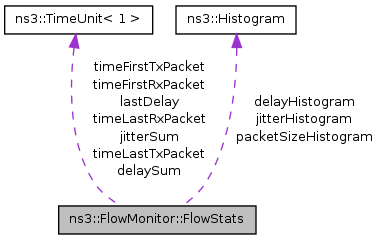Structure that represents the measured metrics of an individual packet flow. More...
#include <flow-monitor.h>

Public Attributes | |
| Time | timeFirstTxPacket |
| Time | timeFirstRxPacket |
| Time | timeLastTxPacket |
| Time | timeLastRxPacket |
| Time | delaySum |
| Time | jitterSum |
| Time | lastDelay |
| uint64_t | txBytes |
| Total number of transmitted bytes for the flow. | |
| uint64_t | rxBytes |
| Total number of received bytes for the flow. | |
| uint32_t | txPackets |
| Total number of transmitted packets for the flow. | |
| uint32_t | rxPackets |
| Total number of received packets for the flow. | |
| uint32_t | lostPackets |
| uint32_t | timesForwarded |
| Histogram | delayHistogram |
| Histogram of the packet delays. | |
| Histogram | jitterHistogram |
| Histogram of the packet jitters. | |
| Histogram | packetSizeHistogram |
| Histogram of the packet sizes. | |
| std::vector< uint32_t > | packetsDropped |
| std::vector< uint64_t > | bytesDropped |
Detailed Description
Structure that represents the measured metrics of an individual packet flow.
Member Data Documentation
| std::vector<uint64_t> ns3::FlowMonitor::FlowStats::bytesDropped |
This attribute also tracks the number of lost bytes. See also comment in attribute packetsDropped.
Contains the sum of all end-to-end delays for all received packets of the flow.
Contains the sum of all end-to-end delay jitter (delay variation) values for all received packets of the flow. Here we define _jitter_ of a packet as the delay variation relatively to the last packet of the stream, i.e.  . This definition is in accordance with the Type-P-One-way-ipdv as defined in IETF RFC 3393.
. This definition is in accordance with the Type-P-One-way-ipdv as defined in IETF RFC 3393.
Total number of packets that are assumed to be lost, i.e. those that were transmitted but have not been reportedly received or forwarded for a long time. By default, packets missing for a period of over 10 seconds are assumed to be lost, although this value can be easily configured in runtime
| std::vector<uint32_t> ns3::FlowMonitor::FlowStats::packetsDropped |
This attribute also tracks the number of lost packets and bytes, but discriminates the losses by a _reason code_. This reason code is usually an enumeration defined by the concrete FlowProbe class, and for each reason code there may be a vector entry indexed by that code and whose value is the number of packets or bytes lost due to this reason. For instance, in the Ipv4FlowProbe case the following reasons are currently defined: DROP_NO_ROUTE (no IPv4 route found for a packet), DROP_TTL_EXPIRE (a packet was dropped due to an IPv4 TTL field decremented and reaching zero), and DROP_BAD_CHECKSUM (a packet had bad IPv4 header checksum and had to be dropped).
Contains the absolute time when the first packet in the flow was received by an end node, i.e. the time when the flow reception starts
Contains the absolute time when the first packet in the flow was transmitted, i.e. the time when the flow transmission starts
Contains the absolute time when the last packet in the flow was received, i.e. the time when the flow reception ends
Contains the absolute time when the last packet in the flow was transmitted, i.e. the time when the flow transmission ends
Contains the number of times a packet has been reportedly forwarded, summed for all received packets in the flow
The documentation for this struct was generated from the following file:
- src/contrib/flow-monitor/flow-monitor.h
 1.7.1
1.7.1